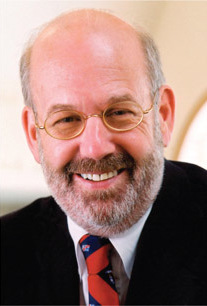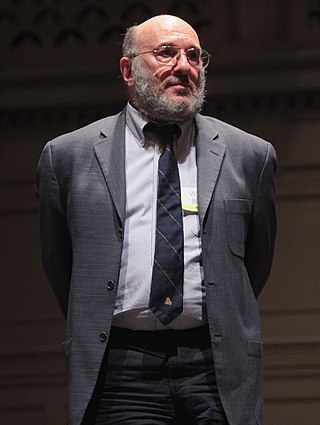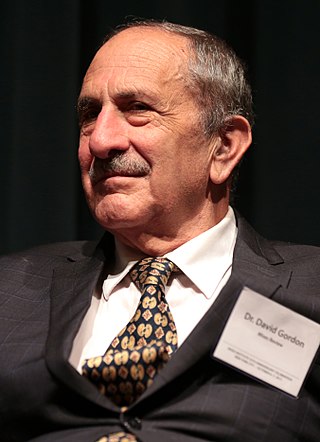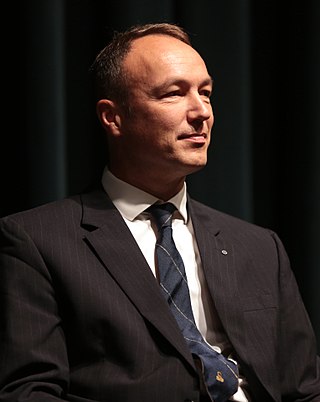
Murray Newton Rothbard was an American economist of the Austrian School, economic historian, political theorist, and activist. Rothbard was a central figure in the 20th-century American libertarian movement and a founder and leading theoretician of anarcho-capitalism. He wrote over twenty books on political theory, history, economics, and other subjects.

Hans-Hermann Hoppe is a German-American economist of the Austrian School, philosopher and political theorist. He is Professor Emeritus of Economics at the University of Nevada, Las Vegas (UNLV), Senior Fellow of the Ludwig von Mises Institute, and the founder and president of the Property and Freedom Society.
Ludwig von Mises Institute for Austrian Economics, or Mises Institute, is an Austrian economics and libertarian nonprofit think tank headquartered in Auburn, Alabama, United States. It is named after the Austrian School economist Ludwig von Mises (1881–1973).

Llewellyn Harrison Rockwell Jr. is an American author, editor, and political consultant. A libertarian and a self-professed anarcho-capitalist, he founded and is the chairman of the Mises Institute, a non-profit dedicated to promoting the Austrian School of economics.
Paleolibertarianism is a libertarian political activism strategy aimed at uniting libertarians and paleoconservatives. It was developed by American anarcho-capitalist theorists Murray Rothbard and Lew Rockwell in the American political context after the end of the Cold War. From 1989 to 1995, they sought to communicate libertarian notions of opposition to government intervention using messages accessible to working and middle-class people of the time, and combining libertarian free market views with the cultural conservatism of Paleoconservatism, while also opposing protectionism. The strategy also embraced the paleoconservative reverence for tradition and religion. This approach, usually identified as right-wing populism, was intended to radicalize citizens against the state. The name they chose for this style of activism evoked the roots of modern libertarianism, hence the prefix paleo. That founding movement was American classical liberalism, which shared the anti-war and anti-New Deal sentiments of the Old Right in the first half of the 20th century. Paleolibertarianism is generally seen as a right-wing ideology.
The non-aggression principle (NAP), also called the non-aggression axiom, is a concept in which aggression, defined as initiating or threatening any forceful interference against an individual, their property, or promises (contracts) for which the aggressor is liable and in which the individual is a counterparty, is inherently wrong. There is no single or universal interpretation or definition of the NAP, with different definitions varying in regards to how to treat intellectual property, force, abortion, and other topics.
Ralph Raico was an American libertarian historian of European liberalism and a professor of history at Buffalo State College.

Gerard Casey is an Irish academic who is Professor Emeritus at University College Dublin.

Ludwig Heinrich Edler von Mises was an Austrian School economist, historian, logician, and sociologist. Mises wrote and lectured extensively on the societal contributions of classical liberalism. He is best known for his work on praxeology studies comparing communism and capitalism.

Conceived in Liberty, authored by Murray Rothbard, is a 5-volume narrative concerning the history of the United States from the pre-colonial period through the American Revolution.

For a New Liberty: The Libertarian Manifesto is a book by American economist and historian Murray Rothbard, in which the author promotes anarcho-capitalism. The work has been credited as an influence on modern libertarian thought and on part of the New Right.

The Panic of 1819: Reactions and Policies is a 1962 book by the economist Murray Rothbard, in which the author discusses what he calls the first great economic crisis of the United States. The book is based on his doctoral dissertation in economics at Columbia University during the mid-1950s.
A private defense agency (PDA) is a theoretical enterprise which would provide personal protection and military defense services to individuals who would pay for its services. PDAs are advocated in anarcho-capitalism as a way of enforcing the system of private property.

Walter Edward Block is an American Austrian School economist and anarcho-capitalist theorist. He currently holds the Harold E. Wirth Eminent Scholar Endowed Chair in Economics at the School of Business at Loyola University New Orleans, and is a senior fellow of the non-profit think-tank Ludwig von Mises Institute in Auburn, Alabama. He is best known for his 1976 book Defending the Undefendable, which takes contrarian positions in defending acts which are illegal or disreputable but Block argues are actually victimless crimes or benefit the public.
This is a bibliography of books and other works written by U.S. Congressman Ron Paul.
Percy L. Greaves Jr. was an American free-market economist, historian, and presidential candidate.

Floyd Arthur "Baldy" Harper was an American academic, economist and writer who was best known for founding the Institute for Humane Studies in 1961.

David Gordon is an American libertarian philosopher and intellectual historian influenced by Rothbardian views of economics. Peter J. Boettke, in his Reason Foundation "Reason Papers," Issue No. 19, Fall 1994, describes Gordon as "a philosopher and intellectual historian who is deeply influenced by the Rothbardian strand of economics." He is a senior fellow at the Ludwig von Mises Institute and editor of The Mises Review.

Jörg Guido Hülsmann is a German-born economist who studies issues related to money, banking, monetary policy, macroeconomics, and financial markets. Hülsmann is professor of economics at the University of Angers’ School of Law, Economics, and Management.